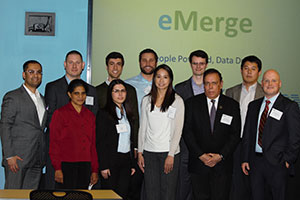Hartford Business Journal – The National Science Foundation has awarded UConn $300,000 to become an I-Corps Site and create the Accelerate UConn program, fostering entrepreneurship and creating businesses out of technology developed at the school.
Technology
IBM Partners with UConn, Other Institutions to Prepare Students for Big Data Jobs
4.4 million jobs will be created worldwide to support big data by 2015, according to a Gartner press release on key issues facing the IT industry.
To prepare students for big data careers, the UConn School of Business offers graduate and undergraduate degree programs in business analytics that focus on data management, analytics, and using emerging technologies to better manage financial risk and other business needs.Continue Reading
Fiserv Collaborates with UConn School of Business on Next-Generation Banking Apps
Brookfield, Wis. and Hartford, Conn. – Fiserv, Inc. (NASDAQ: FISV), a leading global provider of financial services technology solutions, and the University of Connecticut School of Business, one of the top public business schools in the nation, today announced that Fiserv is participating in the university’s Financial Accelerator Program to help educate students and foster innovation. Continue Reading
Master’s Student Team Leverages Digital Marketing Analytics for Logicbroker
Logicbroker can now create the optimal prospect profile to further enhance its customer acquisition strategy as a consequence of our Master’s student team’s work. Continue Reading
IBM, MBAs Use Visual Analytics to Tackle Business Problems
Stamford, Conn.– “Big Data.”
It’s a term we hear over and over again, and its impact is universal. But what is “big?”
According to a 2011 IDC/EMC study, the estimated size of the digital universe was 1.8 zettabytes, and is predicted to grow to 35 zettabytes by 2020. To put that number into perspective, it is the equivalent of 35,000,000,000,000,000,000,000 bytes!Continue Reading
The Wall Street Journal Available to UConn School of Business Students & Faculty
The UConn School of Business is excited to announce that the Wall Street Journal’s premium digital products—including WSJ Online and smartphone and tablet apps—are now available to all business majors and School of Business faculty at Storrs, Connecticut and at regional campuses.
“In our continuing efforts to increase the business information literacy of all our students, we are pleased to be able to offer them this opportunity to keep abreast of all the latest breaking news in the business world,” says Larry Gramling, associate dean for undergraduate programs.
For over a century, WSJ has sustained a legacy of journalistic excellence and is the #1 most trusted newspaper for the 27th consecutive year, according to the Pew Research Center.
The Wall Street Journal provides students with:
- Deeper understanding of current global news and probing analysis of markets, corporations, financials and technology.
- A personalized experience through customizing WSJ.com to track companies and industries for class projects and interview research.
- Access anytime, anywhere with WSJ online and tablet and smartphone apps.
“Having access to the Wall Street Journal gives students the opportunity to read what recruiters are reading—from a concise, reputable source,” says Bill Tracy, educational representative for the Wall Street Journal. “The mobile apps provide them with in-depth videos, interviews, and more than just a traditional news article,” he adds. “Nearly 90% of our student subscribers say that reading WSJ makes them feel confident and prepared.”
CCEA Collaborates in Winning Major DOE Grant for Solar Installations
CCEA Collaborates in Winning Major DOE Grant for Solar Installations
In an effort to make photovoltaic solar installations more attractive and competitive, the U.S. Department of Energy (DoE) is funding a variety of initiatives designed to reduce non-hardware costs by 15-20%. The core objective is to develop innovative policies, models, tools, and data management systems that will deliver this result. The program has two phases: the first provides support for one year for development and evaluation of initiatives. The second phase will scale up and expand those initiatives funded in the first year that prove particularly effective in achieving program objectives. The Connecticut Clean Energy Fund brought together a broad collaborative group to develop a proposal, which has won nearly $500,000 in the first round.
The Connecticut Center for Economic Analysis (CCEA), now housed in the UConn School of Business, assembled a University team including faculty from the Departments of Geography and from Natural Resources and Environment. The UConn team will analyze hardware and non-hardware costs for roof-top solar PV. The second task includes two deliverables: first, the UConn team, in collaboration with Yale’s Center for Business and the Environment, and Snugg Home, will develop a state-wide cost index for rooftop solar PV. Second, UConn, Yale University, Solar Connecticut, and Snugg Home will work together to create an online tool to evaluate the energy potential and the financial performance of solar rooftop systems for any given location in Connecticut. This tool will use currently available overflight digital maps linked with sophisticated NASA databases that provide information on available technologies, their efficiency ratings, and the potential of site-specific solar radiation to deliver an economic and financial analysis of PV potential. In other words, the ultimate objective is to create a tool that would permit any homeowner or business as possible purchasers or any PV vendor to evaluate the solar potential of the roof of their building and then directly see what technologies are available, at what cost, with what efficiency.
The bottom line is that, if the team is able to develop this tool fully, it will deliver material benefit to PV panel vendors, vastly simplifying their marketing, and to home and business owners who can directly see the what the cost and payoff would be for installing PV panels. If the consortium then wins one of the much larger (million plus) second round grants, CCEA and its partners will expand coverage possibly to the entire country.
For more information, please visit http://ccea.uconn.edu/.

